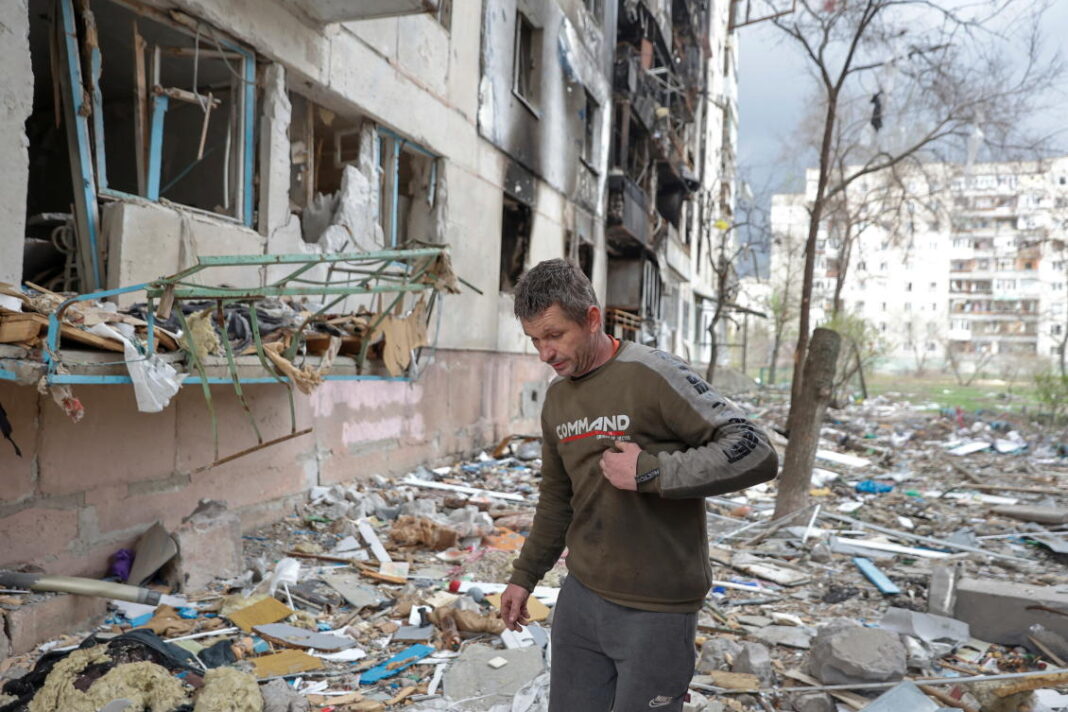KYIV: Ukraine said on Tuesday that Russia had taken control of most of the eastern industrial city of Sievierodonetsk, a bombed-out wasteland whose capture Moscow has made the principal objective of its invasion.
Russia’s all-out assault on the city in Ukraine’s Luhansk province has been met by tough resistance from Ukrainian forces. Russian-backed separatists in Luhansk acknowledged that capturing the city was taking longer than hoped, despite one of the biggest ground attacks of the three-month-long war.
After failing to capture the Ukrainian capital Kyiv and being driven out of northern Ukraine, a Russian victory in Sievierodonetsk and across the Siverskyi Donets river in Lysychansk would bring full control of Luhansk, one of two eastern provinces Moscow claims on behalf of separatists.
Western military analysts say Moscow has drained manpower and firepower from other parts of the eastern front to concentrate on Sievierodonetsk, hoping a massive offensive will secure surrounding Luhansk province for separatist proxies.
Luhansk’s regional governor, Serhiy Gaidai, said nearly all critical infrastructure in Sievierodonetsk had been destroyed and 60 percent of residential property damaged beyond repair.
“Most of Sievierodonetsk is under the control of the Russians. The town is not surrounded and the prerequisites for it to be are not in place,” Gaidai said. Russian shelling had made it impossible to deliver aid or evacuate people, he added.
A pro-Moscow separatist leader said that fighting was raging in the city but that Russian proxies had advanced slower than expected to “maintain the city’s infrastructure” and exercise caution around its chemical factories.
“We can say already that a third of Sievierodonetsk is already under our control,” Russia’s TASS state news agency quoted Leonid Pasechnik, the leader of the pro-Moscow Luhansk People’s Republic, as saying.
Gaidai warned Sievierodonetsk residents not to leave bomb shelters due to what he said was a Russian air strike on a nitric acid tank. The Luhansk People’s Republic’s police force said Ukraine’s forces had damaged it. Ukraine and Russian-backed separatists traded accusations over a similar incident in April.
Russian President Vladimir Putin “is now hurling men and munitions” at Sievierodonetsk, “as if taking it would win the war for the Kremlin. He is wrong,” the Washington-based Institute for the Study of War wrote this week.
Thousands of residents remain trapped in the city. Russian forces were advancing toward its center, but slowly, regional governor Gaidai said. Russia’s advance could force Ukrainian troops to retreat across the river to Lysychansk, he added.
Jan Egeland, secretary general of the Norwegian Refugee Council aid agency which had long operated out of Sievierodonetsk, said he was “horrified” by its destruction. Up to 12,000 civilians remain caught in crossfire, without sufficient access to water, food, medicine or electricity, Egeland said.
“The near-constant bombardment is forcing civilians to seek refuge in bomb shelters and basements, with only few precious opportunities for those trying to escape,” he said.
In its evening briefing note on Facebook, Ukraine’s military command said that Russian forces were “attempting to take full control of Sievierodonetsk” and surround Ukrainian units fighting there.
There were few reports of major shifts elsewhere on the battlefield.
In the east, Ukraine says Moscow is trying to assault other areas along the main front, regrouping to press toward the city of Sloviansk. In the south, Ukraine claimed in recent days to have pushed back Russian forces to the border of Russian-held Kherson province.
Moscow, responding to a European Union agreement overnight to cut imports of Russian oil, widened its gas cuts to Europe in a move that pushed up prices and ratcheted up its economic battle with Brussels.
Russia’s Gazprom said it would turn off supplies to Dutch gas trader GasTerra and Denmark’s Orsted, and to Shell Energy for its contract on gas supplies to Germany, after they refused Moscow’s roubles-for-gas payment scheme.
Ukrainian President Volodymyr Zelensky welcomed the EU’s move to cut Russian oil imports by 90 percent, the bloc’s toughest yet response, but criticized what he called an “unacceptable” delay.
The EU said it will ban imports of Russian oil by sea. Officials said that would halt two-thirds of Russia’s oil exports to Europe at first, and 90 percent by the end of this year as Germany and Poland also phase out imports by pipeline.
But Hungary, which relies on Russian oil through a Soviet-era pipeline, secured an exemption.
Putin launched his “special operation” in February to disarm and “denazify” Ukraine. Ukraine and its Western allies call this a baseless pretext for a war to seize territory.
Ukraine accuses Moscow of war crimes on a huge scale, flattening cities and killing and raping civilians. Russia denies the accusations.
In the second war crimes trial to be held in Ukraine, two Russian soldiers were jailed on Tuesday for 11-1/2 years after pleading guilty to shelling civilian targets.
Russia takes most of Sievierodonetsk city in eastern Ukraine




